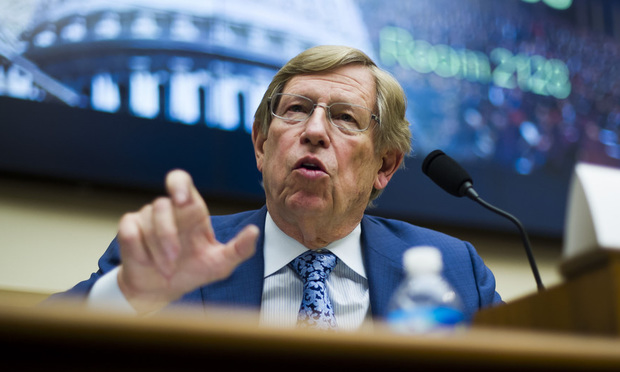Justice Dept. OLC Memos Have No 'Force of Law,' Feds Tell Appeals Court
DOJ's Office of Legal Counsel "simply renders legal advice and has no power to determine the 'rights or obligations' of, or impose 'legal consequences' on, plaintiffs or anyone else," the Justice Department asserted in the U.S. Court of Appeals for the First Circuit.
December 23, 2019 at 12:56 PM
7 minute read
 U.S. Justice Department Office of Legal Counsel. Photo: Diego M. Radzinschi / ALM
U.S. Justice Department Office of Legal Counsel. Photo: Diego M. Radzinschi / ALM
The U.S. Justice Department's internal legal opinions are not final agency action and have no force of law, the government asserted in a new Boston federal appeals case confronting the reach of memos that provide regulatory and enforcement guidance to the executive branch.
Opinions from the Office of Legal Counsel have attracted widespread attention in the Trump administration, as Justice Department officials have issued memos arguing why certain high-level officials cannot speak with House Democrats and also why the president's tax returns cannot be released to congressional investigators.
The Justice Department's policy against indicting a sitting president was established by OLC, whose opinion on that matter was cited by Robert Mueller III, the special counsel, in his report on Russia's interference in the 2016 presidential election and President Donald Trump's efforts to impede prosecutors' inquiry. No federal judge has ruled on that policy, but it has been questioned in court.
Litigation involving OLC memos is rare, and the case in the U.S. Court of Appeals for the First Circuit—involving a controversial opinion from 2018—confronts various issues about the finality and scope of these documents. The memo at the heart of the case said the federal Wire Act applied beyond the online sports gambling industry to cover lotteries and other forms of gambling, a position that reversed an earlier Obama-era OLC opinion that limited the reach of that powerful and ubiquitous federal law.
The New Hampshire Lottery Commission and private vendors serving the agency sued the Justice Department, arguing that they now face potential criminal liability based on the government's new position about the expansive reach of the Wire Act. A New Hampshire federal trial judge in June set aside the Trump DOJ-issued OLC Wire Act memo as a "mistaken" opinion "that no additional process can cure." The Justice Department initiated an appeal, which is underway now.
"OLC opinions are not final agency action reviewable under the [Administrative Procedure Act] because they are predecisional legal advice and do not themselves determine rights or obligations or impose any legal consequences," Jeffrey Sandberg, a Justice Department appellate lawyer, said in new filing Friday in the U.S. Court of Appeals for the First Circuit. He argued the plaintiffs are not entitled to any favorable decision "setting aside OLC's internal advice to another department component."
DOJ lawyers described OLC opinions as "predecisional and deliberative documents, produced at the request of the president or an agency, containing candid legal advice to aid in a governmental decisionmaking process." The government said in its opening brief: "OLC's opinions, being advice, carry no intrinsic legal force for regulated parties. Indeed, reflecting their deliberative nature, many OLC opinions are never publicly disclosed."
OLC opinions, the Justice Department asserted, has no "external effect" unless or until a federal agency "expressly adopts or incorporates by reference OLC's reasoning as the basis for the agency's action." The government said in its brief: "Put simply, while an OLC opinion may sometimes be a precursor to final agency action, it is not itself final agency action."
DOJ lawyers compared OLC opinions to an appellate brief filed in a court case and to memos written by law clerks to a judge—two documents that opine "on legal matters without having the force of law."
The Justice Department's 2018 OLC opinion addressing the reach of the Wire Act drew immediate criticism and questions soon after it was published. The Wall Street Journal earlier this year reported that the DOJ's new memo "hewed closely to arguments made by lobbyists for casino magnate and top Republican donor Sheldon Adelson." DOJ officials disputed there was any outside influence in the decision to expand the department's view that the Wire Act touches online gambling more broadly than the sports arena.
 Ted Olson, of Gibson, Dunn & Photo. Credit: Diego M. Radzinschi / NLJ
Ted Olson, of Gibson, Dunn & Photo. Credit: Diego M. Radzinschi / NLJA team from Gibson, Dunn & Crutcher, representing NeoPollard Interactive LLC, the technology provider for New Hampshire state online lottery system, was among the plaintiffs that sued the Justice Department. NeoPollard's lawyers, including Theodore Olson, a leading appellate partner, argued the 2018 OLC opinion was "deeply flawed." NeoPollard argued in its complaint that "the text, structure, and history of the Wire Act make clear that its prohibitions extend only to gambling on sporting events."
In early 2019, Justice Department leadership issued a memorandum "noting that the department currently has no position about whether the Wire Act applies to the particular conduct of State-run lotteries or their vendors." That memo, from then-Deputy Attorney General Rod Rosenstein, instructed officials not to pursue enforcement actions against state lotteries.
OLC memos have received significant attention during the Trump administration, especially as part of the special counsel's thinking into whether and how to hold Trump accountable for alleged obstruction of justice.
Mueller, the special counsel, said his office had "accepted" OLC memos that cut against the power of prosecutors to indict or criminally prosecute a sitting president. "Apart from OLC's constitutional view, we recognized that a federal criminal accusation against a sitting president would place burdens on the president's capacity to govern and potentially preempt constitutional processes for addressing presidential misconduct," the Mueller report stated.
Last October, two federal trial judges in Washington and New York questioned the OLC policy that says a sitting president cannot be indicted. Chief U.S. District Judge Beryl Howell of the District of Columbia said at a hearing involving Mueller grand jury materials that the OLC position is a "principle that no court has ever said OK to or approved."
In a New York case involving a state subpoena seeking copies of Trump's tax returns, U.S. District Judge Victor Marrero of the Southern District of New York said in an opinion he was "not persuaded that it should accord the weight and legal force the president ascribes to the DOJ memos, or accept as controlling the far-reaching proposition for which they are cited in the context of the controversy at hand."
The tax returns case is now at the U.S. Supreme Court, and the Mueller grand jury material dispute will be argued in the U.S. Court of Appeals for the D.C. Circuit on Jan. 3.
Read more:
Two Judges Question DOJ Policy Against Indicting a Sitting President
DOJ's Legal Counsel Office Picks Up Former US House Lawyer
N.H. Federal Judge Rejects DOJ About-Face Seen as Threat to Online Gambling
Dechert Partnership Worth $1.8M for DOJ 'President's Law Firm' Nominee
As Trump Tests Legal Boundaries, Small DOJ Unit Poised for Big Role
This content has been archived. It is available through our partners, LexisNexis® and Bloomberg Law.
To view this content, please continue to their sites.
Not a Lexis Subscriber?
Subscribe Now
Not a Bloomberg Law Subscriber?
Subscribe Now
NOT FOR REPRINT
© 2025 ALM Global, LLC, All Rights Reserved. Request academic re-use from www.copyright.com. All other uses, submit a request to [email protected]. For more information visit Asset & Logo Licensing.
You Might Like
View All
GOP Now Holds FTC Gavel, but Dems Signal They'll Be a Rowdy Minority
6 minute read
Fired by Trump, EEOC's First Blind GC Lands at Nonprofit Targeting Abuses of Power
3 minute read
Latham Adds Former Treasury Department Lawyer for Cross-Border Deal Guidance
2 minute read
'Erroneous Rulings'?: Wilmer Asks 4th Circuit to Overturn Mosby's Criminal Convictions
3 minute readLaw Firms Mentioned
Trending Stories
- 1Big Law Firms Sheppard Mullin, Morgan Lewis and Baker Botts Add Partners in Houston
- 2Lack of Jurisdiction Dooms Child Sex Abuse Claim Against Archdiocese of Philadelphia, says NJ Supreme Court
- 3DC Lawsuits Seek to Prevent Mass Firings and Public Naming of FBI Agents
- 4Growth of California Firms Exceeded Expectations, Survey of Managing Partners Says
- 5Blank Rome Adds Life Sciences Trio From Reed Smith
Who Got The Work
J. Brugh Lower of Gibbons has entered an appearance for industrial equipment supplier Devco Corporation in a pending trademark infringement lawsuit. The suit, accusing the defendant of selling knock-off Graco products, was filed Dec. 18 in New Jersey District Court by Rivkin Radler on behalf of Graco Inc. and Graco Minnesota. The case, assigned to U.S. District Judge Zahid N. Quraishi, is 3:24-cv-11294, Graco Inc. et al v. Devco Corporation.
Who Got The Work
Rebecca Maller-Stein and Kent A. Yalowitz of Arnold & Porter Kaye Scholer have entered their appearances for Hanaco Venture Capital and its executives, Lior Prosor and David Frankel, in a pending securities lawsuit. The action, filed on Dec. 24 in New York Southern District Court by Zell, Aron & Co. on behalf of Goldeneye Advisors, accuses the defendants of negligently and fraudulently managing the plaintiff's $1 million investment. The case, assigned to U.S. District Judge Vernon S. Broderick, is 1:24-cv-09918, Goldeneye Advisors, LLC v. Hanaco Venture Capital, Ltd. et al.
Who Got The Work
Attorneys from A&O Shearman has stepped in as defense counsel for Toronto-Dominion Bank and other defendants in a pending securities class action. The suit, filed Dec. 11 in New York Southern District Court by Bleichmar Fonti & Auld, accuses the defendants of concealing the bank's 'pervasive' deficiencies in regards to its compliance with the Bank Secrecy Act and the quality of its anti-money laundering controls. The case, assigned to U.S. District Judge Arun Subramanian, is 1:24-cv-09445, Gonzalez v. The Toronto-Dominion Bank et al.
Who Got The Work
Crown Castle International, a Pennsylvania company providing shared communications infrastructure, has turned to Luke D. Wolf of Gordon Rees Scully Mansukhani to fend off a pending breach-of-contract lawsuit. The court action, filed Nov. 25 in Michigan Eastern District Court by Hooper Hathaway PC on behalf of The Town Residences LLC, accuses Crown Castle of failing to transfer approximately $30,000 in utility payments from T-Mobile in breach of a roof-top lease and assignment agreement. The case, assigned to U.S. District Judge Susan K. Declercq, is 2:24-cv-13131, The Town Residences LLC v. T-Mobile US, Inc. et al.
Who Got The Work
Wilfred P. Coronato and Daniel M. Schwartz of McCarter & English have stepped in as defense counsel to Electrolux Home Products Inc. in a pending product liability lawsuit. The court action, filed Nov. 26 in New York Eastern District Court by Poulos Lopiccolo PC and Nagel Rice LLP on behalf of David Stern, alleges that the defendant's refrigerators’ drawers and shelving repeatedly break and fall apart within months after purchase. The case, assigned to U.S. District Judge Joan M. Azrack, is 2:24-cv-08204, Stern v. Electrolux Home Products, Inc.
Featured Firms
Law Offices of Gary Martin Hays & Associates, P.C.
(470) 294-1674
Law Offices of Mark E. Salomone
(857) 444-6468
Smith & Hassler
(713) 739-1250








